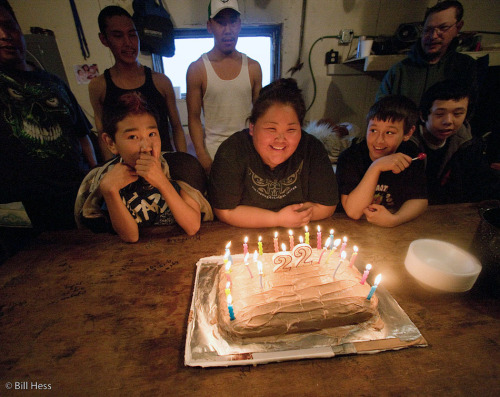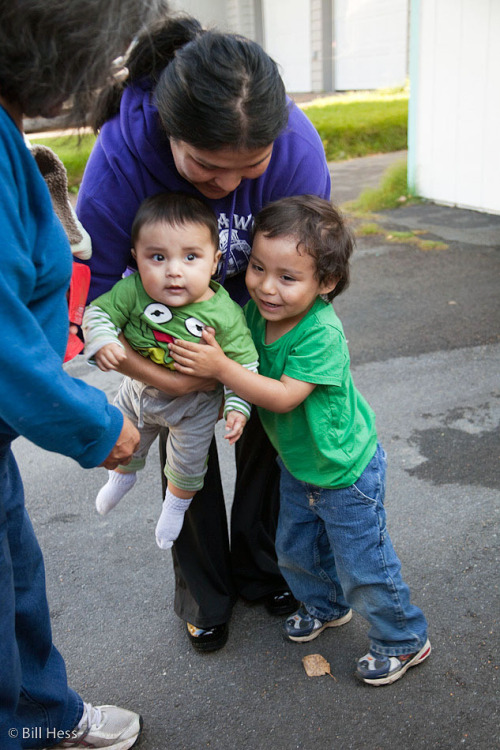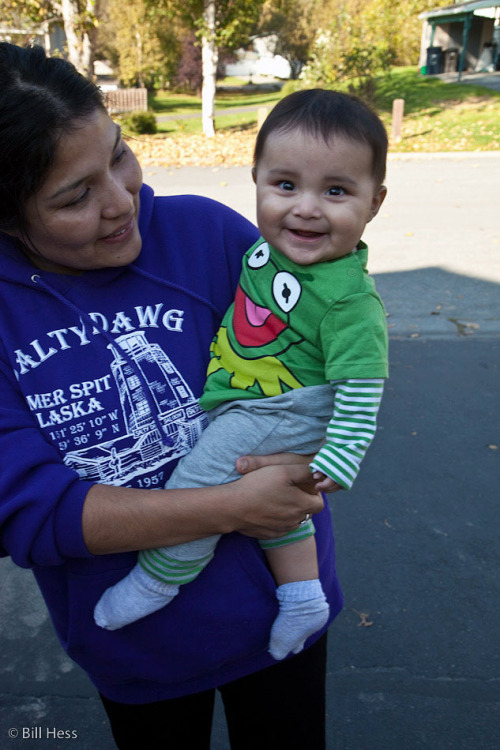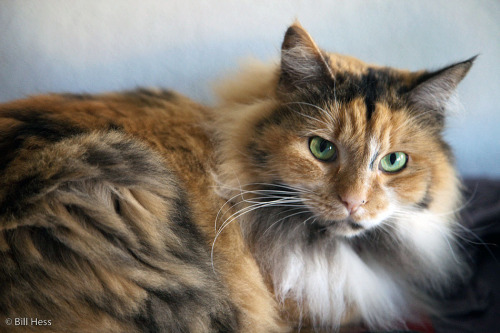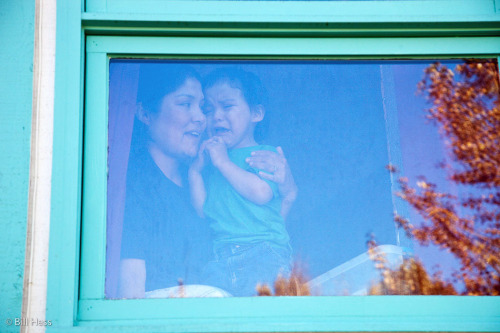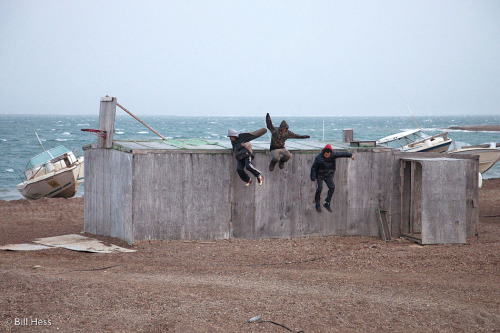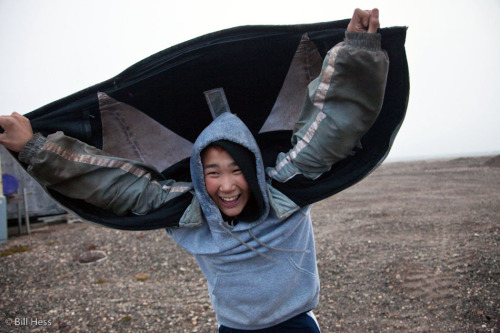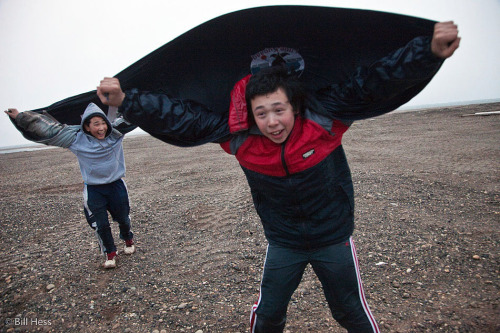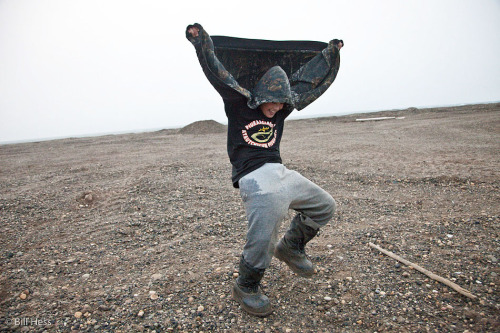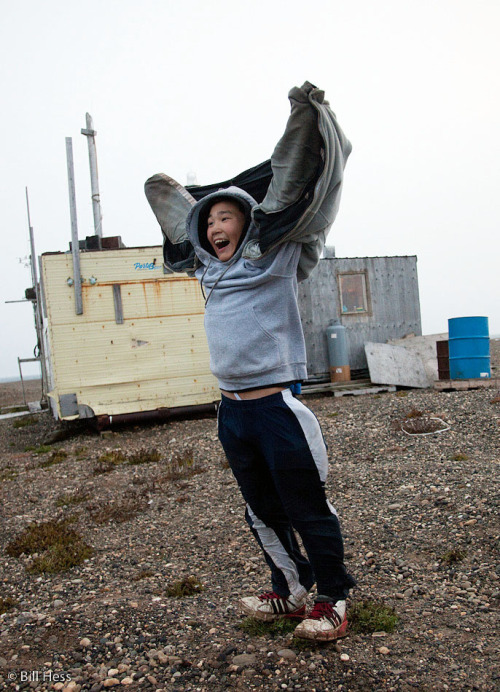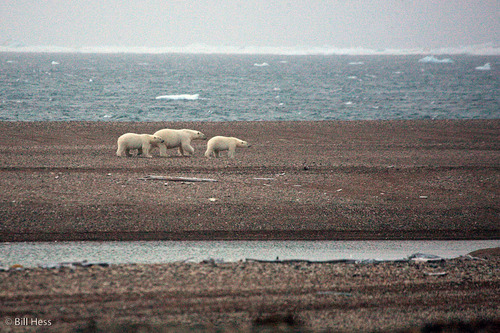The Barrow Whalers travel 1,023 miles to Nikiski, where they lose badly in the first half, but fight back hard through the second
 Sunday, September 19, 2010 at 7:46PM
Sunday, September 19, 2010 at 7:46PM 
I met the Barrow Whalers at the Wal-Mart near the Dimond Center in Anchorage at about 8:30 PM. I had planned to meet them shortly after 6:00 PM, the time that their Era Aviation flight from Barrow had been scheduled to land at Ted Stevens International Airport, but that flight was over two hours late.
As the coaches bought a good supply of water and Gatorade for the next day's game, the Whalers ate Subway sandwiches on the hood of one of the three vans that had been rented to take them to Nikiski - over three hours away.

The Whalers hit the road a minute or two before I did. My electronic gas gauge showed that I only had 150 miles to go before empty, so I would have to stop and gas up. I wondered if I might possibly catch up to them before they reached Nikiski.
Unless they stopped somewhere, it seemed unlikely. Coach Voss told me that the plan was to drive straight through - as even that would not put them there until after midnight. Then they would need to haul their gear into the school, down through the hallways and up the stairs to the wrestling room and there establish their beds.
Their Nikiski hosts planned to bring breakfast to them at 8:00 AM. The game would be at 11:00.
When I pulled into the Girdwood Tesoro station, 50 miles out of Anchorage proper but still with the municipal boundaries, I found that they had stopped there, too.
They left even before I could turn on the unleaded regular pump. I spent at least ten minutes gassing up and buying a few goodies. Still, there were hills to climb ahead, I figured they would not be going that fast and thought I would catch them.
After I got going, I discovered much of the route to be covered with heavy fog.
Traffic was light. I passed a total of four or five slow vehicles and no one passed me, but I did not catch the Whalers. As I neared Kenai, Sally Go Round the Roses came on to station 91.5. I had not heard this song at least for years and think more likely for decades.
Maybe two decades, possibly even three.
When I heard it, in my mind I instantly saw the streets, buildings, vegetation, houses, hill, bay and ocean of Eureka, California, as these things had looked in 1963, when I was 13 and the song popular.
I had always liked it, been enchanted by it - and this was as I heard it on my transistor radio of the time, and on our tiny AM car radio.
Now, it was being played in stereo on our modern, much superior radio and I was totally entranced. Mesmerized. I did not want it to end, but to play and play.
This morning, I downloaded it off iTunes. I have probably listened to it 20 times today, as well as other versions by Grace Slick and the Great Society, Question Mark and the Mysterians and Pentangle and some other versions as well. I enjoyed them all - but none of the other three could compare to the original by the Jaynetts.
When I reached the Nikiski High School, I expected to find the vans there, but I did not. I found only a surprisingly large high school enshrouded in fog so thick that it could not be seen from across the parking lot.
About 20 minutes later, at approximately 12:30 AM, the vans rolled in. They had pulled over at a rest stop along the way but, given the density of the fog, I had not seen them.

I had felt so tired as I drove through Kenai that I briefly thought about abandoning my plan to stay with the team in the school and go for comfort in a hotel, but decided to stick to it. I brought an inflatable bed and pump that Jacob and Lavina had lent me.
After I had picked these and things and Margie up at Jacob and Lavina's on Thursday, I drove to Melanie's house to drop off a table that she had found in Wasilla on Craigslist. Melanie, Rex and Charlie had removed the table from the car and one of them had set the pump down in the driveway, meaning to pick it up afterward, but nobody thought about it again until I drove over it while backing out the driveway.
It did not appear to be damaged, but when I tried to inflate the mattress the pump would not work. So I borrowed another, but there were players waiting behind me. I felt guilty, because they needed their sleep to prepare for the game, so I stopped inflating the mattress a bit before I should have.
The bed sagged in the middle. This impacted the quality of my sleep.
I got out of bed somewhere between 7:00 and 7:30 and found coaches Igou and Battle going over plays the whalers would use this day.

Coach Battle briefs the offense.

Just before it was time to go on the field, I found quarterback Eddie Benson adjusting the foam protection that Coach Houston had helped him place over the cast that protected his broken arm.

Football is a team sport, yet, before each game, a player must go alone into his own mind, into his own psyche and soul to prepare for the battle ahead.

The fog had begun to ease a bit, but was still heavy. The grass was wet and cold. Darius Samuelu prepared to don his helmet and join his teammates.

As the Whalers warmed up and stretched their muscles, Roger Ferguson passed in front of my camera.

Then, the older, more experienced, bigger, heavier, deeper Nikiski Bull Dogs broke through the fog and charged onto the field.

Team captains Lawrence Kaleak, Nathaniel Samuelu and Eddie Benson took the field for the coin toss. The Bulldogs won. They chose to receive.

One could look at images such as this along with the final score of 47 - 7 and conclude that the Bulldogs trounced the Whalers.

No doubt about it, the whalers took some hard blows - including one to the shoulder of Jacob Harris.

Yet, after falling behind 40-0 by the end of the first half, they listened when the coaches told them to look at the second half as a new game, reach into their souls for their inner strength and go out determined to fight and win that two quarter game.
They regrouped and hit hard.

Despite the bleak score, they did not give up and made many excellent plays, including this one when Benson hit James Snow with a fifteen yard pass.

Snow snatched the pass...

...he turned...

...and charged forward for a gain of I don't know how much, as I have not seen the stats, but he did gain a first down.

Blood was drawn on the face of Ulu Tuai.

A bit later, a swath of skin was torn from his arm, just above the elbow. As coaches Battle and Houston patched him up, Tuai urged them to hurry, as he wanted to get back into the game.

Even before Houston could finish binding his wound, Uluakiaho wanted to get back on the field.

They were down by 40 points, but... hey! Do the Whalers look like a football team? They do to me.

The whalers got on the board when Jones hit Jhonel Moreno in the endzone for six. Jones then kicked the extra point.

I am proud to say that although the Whalers did not win, they fought through every minute of the game and they tied the second half, 7-7. Victor Unutoa carries the ball.

Afterward, as they always do, they gathered for a prayer.

And they raised their helmets, just like they did last week, when they won.

As I walked from the field back to the school to gather my stuff together, I saw two dogs, riding through the parking lot in the back seat of car.

Soon, I was on the road and in Kenai I saw these two young women in a convertible that must have a permanent Alaska license plate by October 13.
These days, there is no way to know for sure, but I suspect that even before that date they will cease to drive with the top down.
That van in front of me? That's the final vehicle of the caravan of Whalers, driving back to Anchorage where they will overnight and leave early in the morning back to Barrow.
What a beautiful drive it was!
I should note that during the game, the emcee announced that the Barrow whalers had traveled 1028 miles as the crow flies to play this game.
Next week, they play Delta and I sorely want to go, but I have a commitment in Barrow and will not be able to.
They must win, because although I have concluded that I cannot finish this essay to the depth that I want this season and will have to find the way to continue it through the next year or two, I want to photograph them again this season.
If they win next week, they will go on to the playoffs, October 2 in Kenai. I talked to them. They do plan to win. I plan to be in Kenai.
I can't quite explain it, as I do not know any of these young men that well, but I find that there is something that I like about them.
I missed Adrian Panigeo - number 15. He was out on crutches - for the rest of the season. I have never seen a tougher high school player with any more heart than Panigeo, so I hope to photograph him some more in in the future as well.


